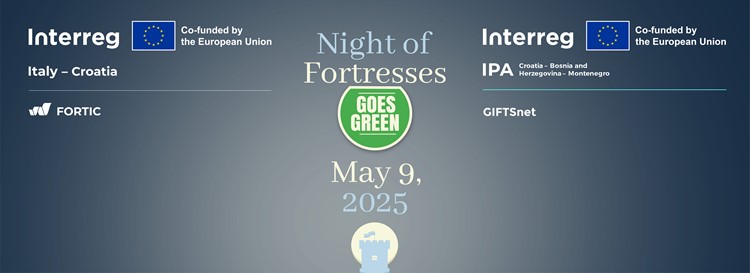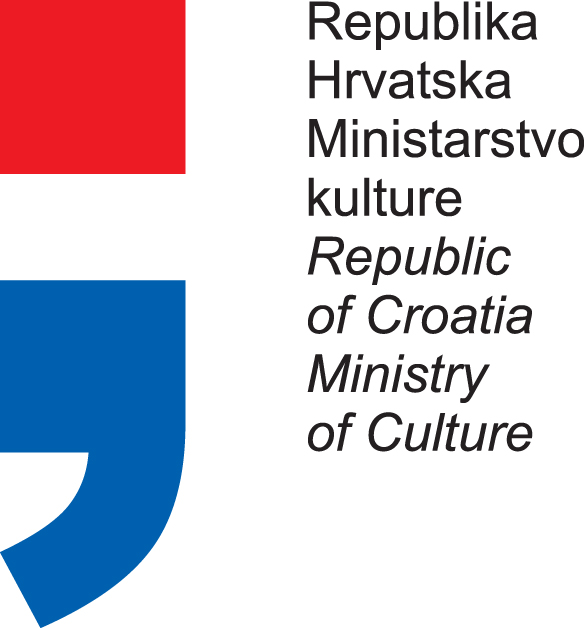
Night of Fortresses Goes Green
This year, the “Night of Fortresses” event highlights sustainability with its new slogan: “Night of Fortresses Goes Green.”
What do we want? To use the event as a tool to raise public and visitor awareness about green and sustainable development.
Over the last three years, the “Night of Fortresses” event has connected more than 50 sites in 8 countries and 40 cities, including coastal and inland fortresses, castles, museums, galleries, and fortified towns, promoting them as tourist attractions. This success showed the potential for stronger cooperation in the development of sustainable cultural tourism.
The idea is simple: connect cultural heritage with ecological responsibility! The goal is to raise visitor awareness about sustainable tourism and practices and to encourage active participation in environmental protection. Through “Night of Fortresses Goes Green,” we are not only celebrating cultural heritage but also contributing to the protection of our planet – step by step, event by event.
Why organize green cultural events?
The cultural sector has a unique opportunity and responsibility to act as a catalyst for change in society, especially in promoting sustainable practices and raising ecological awareness. By organizing "green" events, managers of cultural sites can achieve multiple benefits:
Cultural events provide an opportunity to educate the public about the importance of environmental protection. Through creative programs, visitors can learn about ecological challenges and sustainable practices, encouraging more responsible behavior toward nature.
Sustainable practices in event organization contribute to preserving cultural sites for future generations. By applying environmentally friendly technologies and reducing negative environmental impacts, cultural heritage becomes more resilient and lasting.
Involving the local community in organizing and participating in events strengthens social cohesion and joint efforts toward sustainability. Local initiatives, such as recycling workshops or cleanup actions, encourage a sense of togetherness and shared responsibility.
Sustainable cultural events can attract environmentally conscious tourists, stimulating the local economy. Promoting local products and services reduces the ecological footprint and supports the sustainable development of destinations.
Culture has the power to inspire and encourage changes in society. Through artistic expression and cultural events, it is possible to raise public awareness of environmental issues and motivate active participation in environmental protection.
How? Here are some inspirations:
Teach visitors how old items can gain a new purpose, e.g., creating heritage-inspired souvenirs from recycled materials.
Showcase creativity through artworks made from discarded materials. These exhibitions can be interactive, where visitors contribute final details.
Include documentary screenings and expert lectures on topics such as sustainable tourism, environmental protection, and cultural heritage preservation.
Organize group cleanups around sites before or after the event. Connect participants with local ecological initiatives to continue activities throughout the year.
Teach visitors the importance of preserving cultural sites by avoiding littering.
Encourage visitors to choose eco-friendly transportation methods, reducing their carbon footprint. Offer rewards, such as ticket discounts, for those who come by bike or on foot.
Allow visitors to exchange a certain amount of recyclable material for event tickets, promoting responsible waste behavior.
Organize activities using only reusable or biodegradable materials. Provide recycling and composting options on-site.
Organize themed tours of sites with an emphasis on historical significance and sustainable approaches to heritage preservation.
- Guided tours: Visitors explore sites with guides who share stories about former residents and the importance of heritage preservation through sustainable models.
- Lectures and panel discussions: Experts in history, architecture, and ecology share their experiences on connecting cultural landmarks with sustainability concepts.
Focus workshops on using natural, biodegradable materials instead of synthetic ones:
- Making decorations from dried flowers (no plastic or resin).
- Creating paper souvenirs from recycled paper.
Organize games themed around ecology and heritage preservation:
- Treasure hunts: Focus on finding "sustainable solutions."
- Eco-quizzes: Combine questions about heritage and environmental protection.
Combine history and nature by organizing stargazing events with minimal electricity use and lighting.
Organize concerts with local musicians and bands at open spaces of your sites, using only low-energy equipment.
- Music and nature: Promote quieter, acoustic music to emphasize the connection with the environment.
Use the area around heritage sites for sports activities that promote a healthy lifestyle and care for the environment.
- Eco-friendly races: Organize walking or cycling races starting and ending at heritage sites, highlighting sustainable transport.
- Family eco-challenges: Games like "eco-trails" with challenges where participants learn about recycling, environmental protection, and heritage through fun tasks.
To support event organization, we have developed guidelines to help you think about organizing more sustainable events.
Night of Fortresses Goes Green Guidelines
This material has been produced with the assistance of the European Union. The content of this material is the sole responsibility of PCI Fortress of Culture Šibenik and do not reflect the views of the European Union.
















